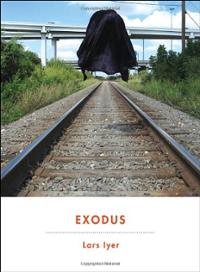Lars, W. and Badiou

The conference dinner. Alain Badiou, sitting all alone.
Why don’t we ask to join him? Why don’t we introduce ourselves, and sit down beside him? W. could speak in his soft French, and I could fetch a bottle of wine and some glasses.
We could lament the fatuity of what passes itself off as ethics in both public discourse and the university, and analyse the supplanting of real philosophy by so-called applied ethics (badminton ethics). We could mull over the origin of the great French philosophy of the ‘60s, and the decline of Critical Theory since the ‘60s.
We could agree, too, that the world-historical mission of philosophy is far from over, far from gone. We could agree that there is to be no more ‘continental’ woolliness, no more Derridean equivocation: that the time has come to think clearly, decisively!We could reflect on the destiny of the notion of the infinite in both philosophical thought and mathematical thought. We could muse upon Koch Curves and the Kimberling shuffle, upon non-averaging sets and non-dividing sets, and consider the nature of love, of art, of politics, of science, as forms of truth.
And perhaps Badiou could entertain us with anecdotes of his own life as a thinker, and perhaps we could entertain him with some anecdotes of our own …
But why should Alain Badiou want to speak to us? He's a man of rigour and mathematical precision! He's a man of politics, of real political commitment!
On Saturday morning, when W. is eating crumpets with Sal, and I’m still lying in bed, Badiou has already jotted down a few notes for Being and Event III; he’s already drafted an obituary essay for a dead fellow thinker — a thought-enemy, granted, but a worthy adversary. He’s already spoken to Sylvain Lazarus on the phone, about their campaign for the sans-papiers …
He’s already had several thoughts concerning his defence of Maoism, and looked over the English translation of one of his plays. He’s already skim-read articles from a dozen international newspapers, and caught up with his emails, replying to Žižek, writing to Jacques Rancière. He’s already written a brief blurb for a forthcoming book by Jean-Luc Nancy (much better than my blurb for Jean-Luc Nancy, W. says). He’s already jotted down the points he wants to cover in the open letter on behalf of the poor of the Paris Banlieus, which he means to send to Le Monde.
Badiou has already had his coffee and croissant, and a freshly squeezed orange juice, and sat out on his terrace in his shirtsleeves, taking in the morning sun, turning over his latest ideas in his head. How many thoughts has he had since he got up? Countless thoughts! How many notions, waiting to coalesce? Countless notions!
How much outrage does Badiou feel, really feel, at the triumph of the right in France? Great outrage! How much horror does he feel at the dreadful plight of the poor? Enormous horror! But Badiou acts on his outrage and his horror. He writes polemical articles to publish in mainstream papers. He circulates petitions and strides out onto the streets.
Ah, how many demonstrations has Badiou seen? How many street-battles? How many cobblestones has he torn up from the ground to throw at police? How many truncheons have bounced off his head? He can remember Althusser as a contemporary, Balibar as a whippersnapper. He remembers the Maoist Barthes, the Maoist Kristeva just home from China … And he remembers the Restoration of the ‘80s, when every leftist dream was lost.
But what would Alain Badiou make of us? What would he conclude? Enemies, he would think. No, not even that, Badiou would think. – ‘Pas enemies. Les tosseurs’. But perhaps he wouldn't think anything at all. Perhaps he'd just look through us, as if, as with evil for Plato, we didn't really exist.
For the mathematical philosopher, vagueness doesn't exist, not really; it's only a deficiency of precision. And pathos doesn't exist for the political philosopher, not unless it is the glint of starlight, impersonal and remote, on the eyeglasses of the militant, brick in hand, charging the police.
